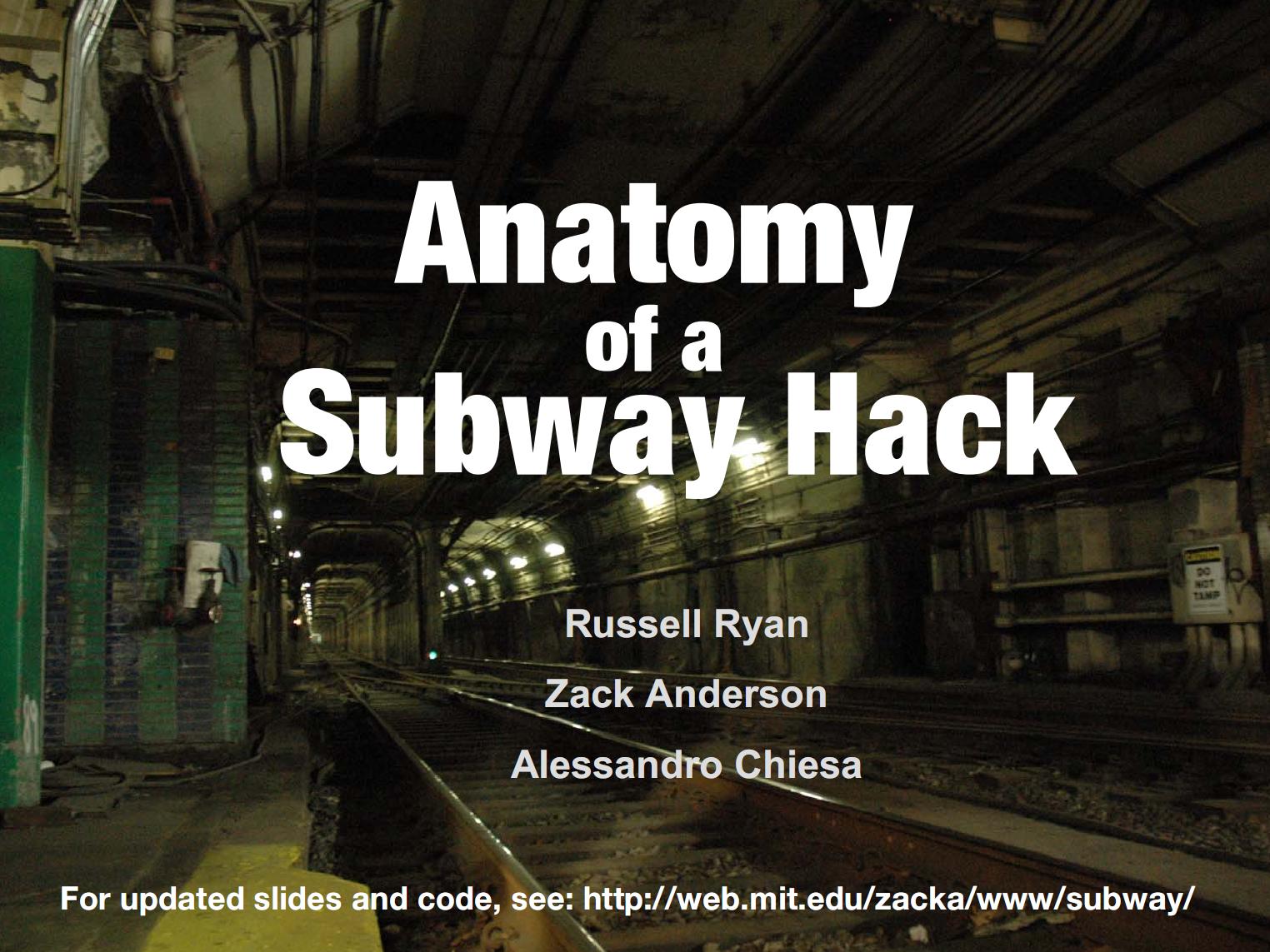
[Zack Anderson], [RJ Ryan], and [Alessandro Chiesa] were sued by the Massachusetts Bay Transit Authority for an alleged violation of the Computer Fraud and Abuse Act after copies of their presentation slides were circulated at Defcon 16. The slides give an eye widening glimpse into the massive security holes present in the Boston subway system. There are at least 4 major security flaws in the subway, which allowed them to get free subway rides by finding unlocked, back door routes into the subway, spoofing magnetic and RFID cards, and attacking the MTBA’s network. Judge Douglas P. Woodlock has issued a gag order, stopping the trio from giving the presentation at Defcon or disclosing sensitive information for ten days. However, the MIT school newspaper, The Tech, has published a PDF of the slides online. The research culminated in the trio warcarting the MTBA’s headquarters and being driven off by police.
13 thoughts on “Defcon 16: MIT Boston Transit Presentation Gagged”
Leave a Reply
Please be kind and respectful to help make the comments section excellent. (Comment Policy)















Warcarting! I love it!
“We have a bunch of security vulnerabilities, but are too lazy to be bothered with them, so shut up. Don’t let the public know that they’re being screwed. If you do, we’ll take you to court. Yeah, I told you to shut up, but you didn’t listen, so now I’ll court-order you to stop talking. Our problems don’t exist!” Yet another reason I don’t like Boston.
Let’s give thanks to the EFF for staying up all night and attempting to fight this gag order over the last 24 hours. Although they failed, the EFF is continuing to fight for these students right to speak.
I think the real problem is they went beyond simply finding the vulns. They *applied* them. This puts them in a very sticky legal situation, especially since their own slides act as admission of guilt.
Anybody make a copy of the “updated slides and code” from the website before it was pulled?
Yeah, but the application of the exploits acts as a proof of concept. If these vulnerabilities were ignore-able, the transit authority wouldn’t have fought so hard to shut the kids up. If they didn’t actually apply the exploits, it becomes the kids’ word against the transit authority’s. The fact that they applied the exploits proves to everyone that the vulerabilities actually exist. Let’s just hope this whole ordeal acts as a wake-up call to the transit authority, as it very well should. But it’s Boston, so there’s a good chance it won’t. (Remember, same place a bunch of LED’s thrown together on a PCB was misconstrued as a bomb.)
If you give a crap about freedom of speech, download, copy, and distribute these slides at every opportunity. Don’t let some corrupt judge tell us what we can and can’t see or read.
Aside from the subway hacks, the presentation says they’ve built alot of really cool tools to help with their research.
One particular one is a toolchain to easily program ‘multi-core’ FPGAs to assist with their brute forcing of the subway RFID chips.
Even if the gag order continues, hopefully they’ll be able to post some of the tools that they developed that aren’t to do with subway systems directly.
If you are interested in their court case you can find copies of all of the court documents and some email correspondence here http://cryptome.org/mbta-v-zack/mbta-v-zack.htm
Also I think the MBTA is taking the wrong approach here. Instead of trying to give a gag order and hide the information (which will never work) they should just hire these kids to fix the system. I mean anyone who can create a “one button party mode”(http://web.mit.edu/zacka/www/midas.html) for their dorm room can fix these problems.
Interesting point – this has showed up on WikiLeaks…
https://secure.wikileaks.org/wiki/Anatomy_of_a_Subway_Hack_2008
Sapere Aude,
M.
interesting stuff here I wish i knew more about this stuff im trying to learn more about it
These kids are heroes.
These kids have showed how careless was the security in this public transportation used by many civilians.
What would append if some nutjob decide to make an attack on the subway?
How many lives we have to put on risk before doing something about it?
Do we need to wait for a disaster to append before we decide to do something about it?
These kids should be rewarded for being good citizens and risk their freedom in order to protect our lives by publishing the security risk on Boston.
Unfortunately, that’s the way most of these things work. When does a stoplight get installed at a busy and dangerous intersection? When enough people are injured or killed. I don’t see this being any different. Now I realize this was a few year ago now so please, someone prove me wrong, show me that they actually bothered to fix the problems, and not just leave it with attacking the MIT students.